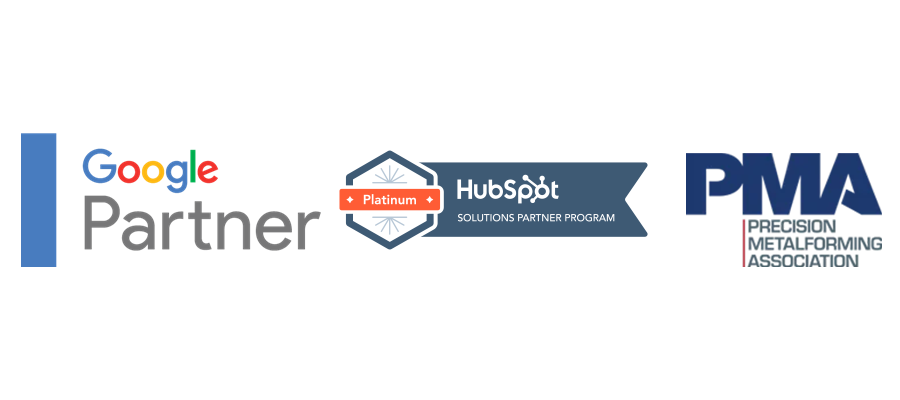What Makes Industrial Web Design Different?
What Most Manufacturing Website Designs Get Wrong
It is not uncommon for industrial B2B companies to make several mistakes when it comes to creating and maintaining their manufacturing websites. This is a result of the cross-disciplinary nature of industrial web design. For example a web designer may know exactly how to incorporate search engine optimization (SEO) elements into a manufacturing website, but they don’t understand the type of content that is valuable to the industrial B2B audience. On the flip side of that, an engineer may perfectly understand the demands of the target audience, but not know how to properly structure content and other resources on their website. With so many online guides and resources focused on making B2C websites, it’s only natural for some mistakes to be made along the way.
Most issues like this simply boil down to a lack of collaboration between teams. While they may seem small on their own, each individual issue on a manufacturing website can add up to create a web domain that is overall difficult to navigate, lacking in quality content, or poorly optimized- all of which will tank the site’s search engine results page (SERP) visibility.
Considerations for Web Dev
One common pitfall of working with freelance web developers and more general marketing agencies is that they don’t understand the needs and preferences of the industrial B2B audience. This can result in manufacturing websites that may seem user-friendly at an initial glance, but ultimately lack information that’s relevant to the intended audience or fail to properly showcase the value of the company’s products and services.
Manufacturers and industrial companies are largely B2B operations whose target audience falls within a very narrow subset of users. Each sale made by these companies is typically a large transaction of hundreds of thousands of dollars at a time- a far cry from modern B2C e-commerce websites. For that reason, manufacturing websites should be precisely tailored to resonate with their exact audience rather than appeal to the masses.
For web developers to avoid this issue, it is important to conduct thorough research on the niche industrial B2B audience and understand their specific requirements. This includes understanding their concise yet detail-oriented nature; their pursuit of high efficiency in all they do; and their decision-making role within their companies.
Consideration for Engineers
Engineers and experts at an industrial B2B company may know their offerings and their target audience inside and out, but not know the first thing about manufacturing website design. A common mistake amongst these DIY-ers is having a cluttered and overwhelming website design that fails to deliver a satisfactory user experience (UX).
Manufacturing websites should have a simple and clean layout that is easy to navigate. This includes using clear and concise headings, subheadings, and bullet points to organize information. High-quality images and videos should also be incorporated to showcase products and services effectively. Many manufacturing companies also tend to neglect the importance of mobile responsiveness. In today’s digital age, it is crucial for manufacturing websites to be optimized for mobile devices. This ensures that professionals in the industrial B2B sector can access the website seamlessly whether they are at their desk or on the go.
Lastly, companies often fail to provide easy contact and request for quote options on their manufacturing websites. It is important to have multiple, strategically placed contact forms or buttons, as well as clear instructions on how to request a quote or otherwise submit a contact form. This allows potential customers to easily reach out and start a conversation about potential business opportunities.
Avoiding Common Manufacturing Website Design Pitfalls
The good news is that these mistakes, while common, can be easily avoided with proper communication and collaboration between website development experts and engineers who know their audience well. By avoiding these common pitfalls and incorporating the design considerations mentioned in the article, companies can create and maintain successful manufacturing websites that cater to the needs of the industrial audience, improve user experience, increase credibility, trust, and enhance SEO.

Our web dev team works hand in hand with degreed engineers to deliver the content your audience wants in a seamlessly navigable manufacturing website. Schedule your discovery call with MFG Tribe today!
Understanding the Industrial Audience
Technical and Detail-Oriented
The first thing to understand about the industrial B2B audience is that they are typically technical and detail-oriented individuals. They are looking for specific information about products and services, and they want to know the technical specifications and capabilities to learn if they have found a viable solution to their problem. This means that industrial websites need to provide detailed and accurate information in a clear and organized manner.
Highly Efficient
Manufacturing professionals are often busy and hyper-aware of how they spend their time. They won’t waste time sifting through a cluttered website or searching for information. This means that industrial web design needs to be efficient and user-friendly, allowing visitors to quickly find the information they need.
Decision-Makers
These same professionals are often decision-makers within their companies. This means that they are looking for solutions that will benefit their business and improve their operations. Manufacturing websites need to showcase the benefits and value of products and services in a way that resonates with these decision-makers.
Design Considerations for Manufacturing Websites
Simple and Clean Layouts
Manufacturing websites should have a simple and clean layout that is easy to navigate. This means using a minimalistic design with clear and concise headings, subheadings, and bullet points. The goal is to make it easy for visitors to find the information they need without feeling overwhelmed by cluttered design elements.
High-Quality Images and Videos
Manufacturing websites should also incorporate high-quality images and videos to showcase products and services. This is especially important for industrial B2B businesses, where visuals can help demonstrate the capabilities and quality of products. Images and videos should be professional and well-lit, providing a clear representation of the products and services offered.
Mobile Responsiveness
It is essential for manufacturing websites to be mobile-responsive, as many professionals in this industry are often on the go and may access websites from their mobile devices. A mobile-responsive design ensures that a manufacturing website is optimized for all devices, providing a seamless user experience.
Easy Contact and Request for Quote Options
Manufacturing websites should make it easy for visitors to contact the company or request a quote. This means having a prominent contact form or button on the website, as well as clear instructions on how to request a quote. This allows industrial B2B customers to easily reach out and start a conversation about potential business opportunities.
Do your conversions need a boost? Let our team give your website the refresh it needs to increase visibility, drive meaningful traffic, and get your company’s revenue back on track.
Benefits of Industrial Web Design
Improved User Experience
One of the main benefits of industrial web design is an improved user experience. By understanding the needs and preferences of the industrial audience, a website can be designed to provide a seamless and efficient experience. This can lead to increased engagement and conversions, as visitors are more likely to stay on a website that is easy to navigate and provides the information they need.
Increased Credibility and Trust
A well-designed manufacturing website can also increase credibility and trust with potential customers. A professional and user-friendly website can make a positive first impression and showcase the company’s expertise and capabilities. This can help build trust with potential customers and increase the likelihood of them choosing your company for their industrial B2B needs.
Better Search Engine Optimization (SEO)
Industrial web design also plays a crucial role in SEO. By incorporating relevant keywords and optimizing the website’s structure and content, an industrial website can rank higher in search engine results. This can lead to increased visibility and traffic to the website, ultimately resulting in more potential leads and conversions.
Industrial web design is a specialized field that requires a deep understanding of the industry and its target audience. By understanding the needs and preferences of the industrial B2B audience, a website can be designed to provide a seamless and efficient experience that both web developers and manufacturing companies can be proud of. This can lead to increased engagement, credibility, and conversions for industrial businesses.





